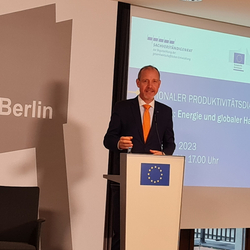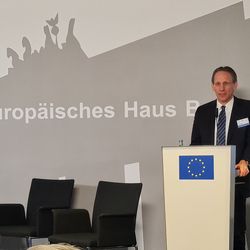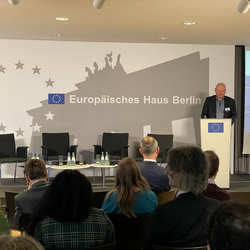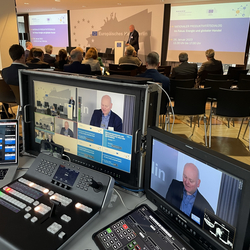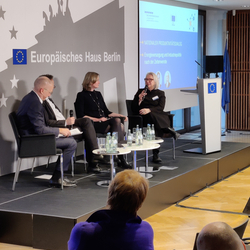Focus on energy and global trade
NATIONAL PRODUCTIVITY DIALOGUE 2023
Lively discussions, spontaneous questions and time for networking: The fourth National Productivity Dialogue was held as a traditional event again after two years. Below you can find videos and a short summary of the event.
In his opening speech, State Secretary Jörg Kukies (Federal Chancellery) spoke out in favour of continuing Germany's strong integration into the global economy. He demanded, "We must focus on the factors that have made us strong: Education, innovation, competition." For him, research funding and better framework conditions for start-ups are key. He also emphasised the importance of Germany's cooperation with its European partners. The moderator Klaus Stratmann took the opportunity to discuss with him questions on resilience, future trade relations, the green transformation and economic policy measures in the energy crisis.
After that, Kerstin Andreae (BDEW) and Klaus Müller (Bundesnetzagentur) discussed with Monika Schnitzer on the topic of 'Energy supply and industrial policy after the Zeitenwende'. On electricity supply, Kerstin Andreae said: "Energy companies need reliable framework conditions to invest in the energy transition." However, the expansion of renewable energy "must take place at a pace that we have not seen before." Monika Schnitzer explained in connection with government support measures for industry and electricity suppliers, "It is problematic to base our industrial structure on subsidies in the long term," as ultimately taxpayers are bound to pay for these subsidies. Klaus Müller said: "We will have to rely on stabilising and expanding our inflows from Norway, the Netherlands, Belgium and France so that we diversify as much as possible." Saving at least 20 per cent gas across all sectors is the right and sensible thing to do according to the models that the Bundesnetzagentur is calculating, he said.
Martin Werding spoke with Elga Bartsch (BMWK) about securing skilled labour in Germany: how to increase the labour force participation of women and older people, how to succeed in labour force immigration and how to reduce the brain drain by making Germany more attractive. She said: "There must be a transformative labour market policy. The focus has to move away from unemployment figures to unfilled apprenticeships."
In the second panel, Sabine Weyand (EU Commission), Yasmin Fahimi (DGB) and Martina Merz (thyssenkrupp) discussed with Veronika Grimm supply chains and dependencies in international trade. In the lively discussion, Sabine Weyand stressed that resilience and efficiency should not be played off against each other: "The key to our productivity and resilience are open, competitive markets – both within the EU and globally." Martina Merz addressed the restructuring and building of resilient supply chains by companies as a result of geopolitical distortions. "However, this does not happen overnight, but takes months or even years." Yasmin Fahimi added, considering the solar technology: "We have to think carefully, whether we can manage to establish an industry in Europe, with a 90 per cent dependency on China – and thus also ensure new value creation and value chains."
Lastly, Ulrike Malmendier and Pierre-Olivier Gourinchas (IMF) exchanged views on the energy crisis and energy prices. Pierre-Olivier Gourinchas said, "We could see that countries that have more fiscal space were able to do more in terms of protecting businesses and households. The amount of fiscal space you have is very useful in an extreme event. It is important to build buffers over time." In closing, Ulrike Malmendier summed up the discussion: "How to set the right incentives for businesses to have the long term view and undertake the costs to diversify supply chains, remains an open question."
The National Productivity Dialogue is a platform for regular exchange at national and international level on productivity. Promoting an exchange is one task of the German Council of Economic Experts as the National Productivity Board of Germany.
The National Productivity Dialogue, organised by the Representation of the European Commission in Germany together with the German Council of Economic Experts, took place for the fourth time on 26 January 2023.

